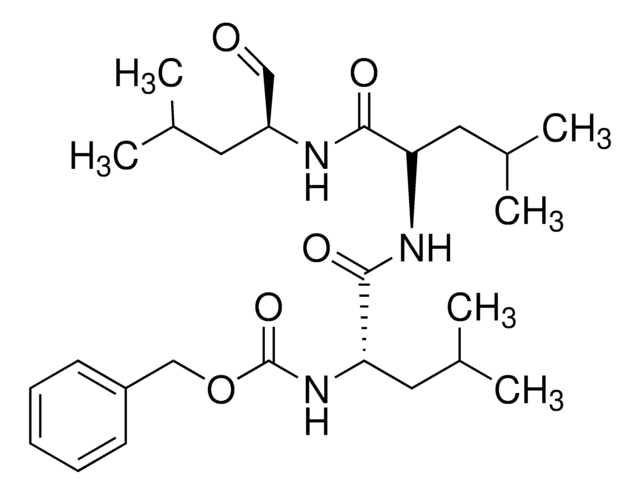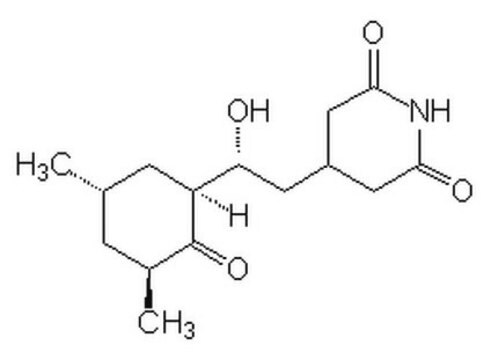474790
MG-132
A cell-permeable, potent, reversible proteasome inhibitor (Ki = 4 nM).
Sinônimo(s):
Z-Leu-Leu-Leu-al, Carbobenzoxy-L-leucyl-L-leucyl-L-leucinal, Z-LLL-CHO, Proteasome Inhibitor XI, MG-132
About This Item
Produtos recomendados
Nível de qualidade
Ensaio
≥98% (HPLC)
Formulário
solid
fabricante/nome comercial
Calbiochem®
condição de armazenamento
OK to freeze
cor
white
solubilidade
DMSO: 20 mg/mL
ethanol: 20 mg/mL
Condições de expedição
ambient
temperatura de armazenamento
−20°C
cadeia de caracteres SMILES
[H]C(=O)[C@H](CC(C)C)NC(=O)[C@H](CC(C)C)NC(=O)[C@H](CC(C)C)NC(=O)OCc1ccccc1
InChI
1S/C26H41N3O5/c1-17(2)12-21(15-30)27-24(31)22(13-18(3)4)28-25(32)23(14-19(5)6)29-26(33)34-16-20-10-8-7-9-11-20/h7-11,15,17-19,21-23H,12-14,16H2,1-6H3,(H,27,31)(H,28,32)(H,29,33)/t21-,22-,23-/m0/s1
chave InChI
TZYWCYJVHRLUCT-VABKMULXSA-N
Procurando produtos similares? Visita Guia de comparação de produtos
Amino Acid Sequence
Descrição geral
Ações bioquímicas/fisiológicas
proteasome
Advertência
Sequência
Reconstituição
Outras notas
Steinhilb, M.L., et al. 2001. J. Biol. Chem.276, 4476.
Meriin, A.B., et al. 1998. J. Biol. Chem. 273, 6373.
Adams, J., and Stein, R. 1996. Ann. Rep. Med. Chem.31, 279.
Klafki, H.W., et al. 1996. J. Biol. Chem.271, 2865.
Lee, D.H., and Goldberg, A.L., 1996. J. Biol. Chem.271, 27280.
Wiertz, E.J., et al. 1996. Cell84, 769.
Jensen, T.J., et al. 1995. Cell 83, 129.
Read, M.A., et al. 1995. Immunity2, 493.
Rock, K.L., et al. 1994. Cell 78, 761.
Informações legais
Código de classe de armazenamento
11 - Combustible Solids
Classe de risco de água (WGK)
WGK 3
Certificados de análise (COA)
Busque Certificados de análise (COA) digitando o Número do Lote do produto. Os números de lote e remessa podem ser encontrados no rótulo de um produto após a palavra “Lot” ou “Batch”.
Já possui este produto?
Encontre a documentação dos produtos que você adquiriu recentemente na biblioteca de documentos.
Os clientes também visualizaram
Nossa equipe de cientistas tem experiência em todas as áreas de pesquisa, incluindo Life Sciences, ciência de materiais, síntese química, cromatografia, química analítica e muitas outras.
Entre em contato com a assistência técnica









